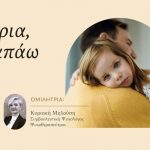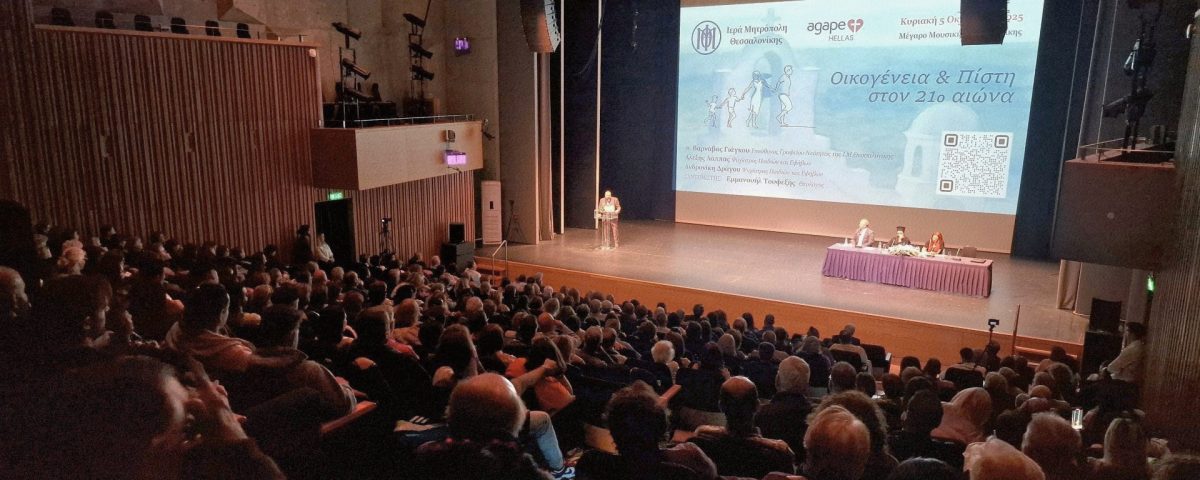
9th Annual Global Leadership Summit – GLS (September 2025)
30/09/2025
Online Event: “I Set Boundaries Because I Love You – The Challenge of Discipline” (November 2025)
17/11/2025“Family and Faith in the 21st Century”: An event by the Holy Metropolis of Thessaloniki and Agape Hellas (October 2025)

Organizers: Holy Metropolis of Thessaloniki – Agape Hellas /Venue: Thessaloniki Concert Hall / Date: October 5, 2025
In a hall filled to capacity, the event “Family and Faith in the 21st Century” took place with great success. The speakers — Fr. Varnavas Yiangou, Mr. Alexis Lappas, and Mrs. Androniki Dragou — approached the subject from different yet interconnected perspectives: faith, the soul, and human relationships. The evening highlighted, through theological reflection and psychological insight, the family’s importance as a space of love, care, and spiritual seeking in today’s world.
Fr. Varnavas Yiangou
Fr. Varnavas emphasized that faith is not an intellectual acceptance of God but a deep trust and a personal relationship with the living God — a gift of the Holy Spirit that transforms the human being and gives them a new way of existence. Without this, the Christian’s life remains superficial, often indistinguishable from that of a person who denies God.
Faith calls the human being to re-examine the motives behind their actions — not merely on the level of moral behavior but in terms of deeper intention and existential meaning.
This is especially relevant to marriage and family life, which are often experienced without a spiritual foundation, sometimes guided by narcissistic or self-centered motives. Marriage, he said, is not social fulfillment nor a “safe harbor” that solves problems — it is a great mystery, a school of love, freedom, and creativity, where spouses are called to transcend duality and become bearers of universal love.
Faith also gives new depth to “eros”, which ceases to be a desire for possession and becomes a quest for the truth of the other. True love and affection liberate and divinize the human being, making one capable of seeing beauty behind ugliness, of loving and forgiving.
A mature person — one who has experienced God — does not seek satisfaction from the other but rejoices in their presence as a blessing. Without reference to Christ, marriage and family cease to be a communion of love and become a field of toil and fear. It is our faith that opens us to God and to others. Only then does self-loss become gain, love become transcendence, and the other a person of paradise.
Highlights
“Faith is not an ideology. It is a relationship, trust, and a way of existence.”
“Marriage does not solve problems. It creates opportunities for love, freedom, and maturity.”
“Eros is not possession. It is the search for the truth of the other.”
“We find ourselves only when we lose ourselves for the sake of the other.”
“Without Christ, marriage becomes a contract. With Him, it becomes a mystery of life.”
Androniki Dragou
Mrs. Dragou’s address revealed the profound connection between faith, care, and love from an existential and psychological perspective. Beginning with the Hymn of Love and the words of St. Paisios, she underlined that faith and love go hand in hand: one cannot love without believing, nor believe without loving. In the life of the Church, values are not lived abstractly but within relationships — our relationship with ourselves, with others, and with Christ. Ultimately, the way we relate reveals the way we believe.
She also focused on the concept of “care” as a way of being. Care begins with personal responsibility — for one’s body, health, order, and duties — and matures into offering: when we truly give something of ourselves, it returns as joy and inner fulfillment. True care, however, presupposes self-knowledge — recognizing and activating one’s good qualities, without false humility or defensiveness.
Drawing from psychiatry and developmental psychology, Mrs. Dragou highlighted that the first bond between infant and parent is the foundation of trust and the seed of our capacity for faith. Within this trustworthy environment — the family and community, “the village that raises a child” — the first images of God are formed, and our inner flexibility to face life’s crises is shaped. She also noted that the search for meaning accompanies human beings from childhood “whys” to the questions of adulthood.
She stressed that love is not simply a positive emotion but an overcoming of boundaries: we learn ourselves through the other, daring to “adopt” them with the help of the neighbor’s “kind gaze.”
In closing, she referred to the iconography of the Dormition of the Theotokos, where Christ is depicted tenderly holding her soul — a profound image of care, hope, and assurance that His love ultimately has the final word.
Highlights
“Faith and love cannot be separated. One gives birth to and sustains the other.”
“Care is not just duty. It is a way of being — an act of offering that gives us joy and meaning.”
“Trust is rooted in the first relationship of life. There, the first images of God are engraved within us.”
“Love is the transcendence of personal limits: I learn myself through the other.”
“Without meaning, knowledge and experience become burdensome. With meaning, they become life.”
“Christ holds our soul tenderly — a true image of care that gives birth to hope.”
Alexis Lappas
Mr. Lappas began by saying that much of adult life resembles an effort to compensate for the unfinished experiences of childhood — we thirst to heal what remains incomplete, often seeking this “debt” from our loved ones, even from God.
He underlined that Christ does not call us to the “logic” of reciprocity (“I love those who love me”) but to transcendence: to make room even for our enemies and to learn the power of love. He described how the climate of fear — fueled by media and social tensions — pushes us to seek “strong shoulders”: a God of power who changes others for our sake, but not ourselves. Yet the Gospel calls us to a metanoia of the mind — a passage from the love of power to the power of love.
Using examples from daily life — family, school, parish — he emphasized the shift “from the behavioral to the relational.” He spoke of fewer admonitions and more compassion and companionship, since the family should be understood as a workshop of relationships, not a performance machine. Anything that does not strengthen the desire for life, he said, does not belong to it. He also noted two elements that “wound” the family: narcissistic individualism (“everything on my terms”) and the tangle of enmeshment (“everyone mixed up with everyone”). He emphasized that the transformation of parents is a prerequisite for the healing of children and that every wound or trial can become an opportunity for personal growth and sanctification.
In closing, he reminded that every cross needs hands to hold and hearts to stand beside it — even Christ did not carry His cross alone. With a poetic and consoling tone, he concluded that love cannot be preached; it can only be offered. For, ultimately, “every time the world ends,” what the soul seeks is not judgment but a hand to hold it.
Highlights
“From the love of power to the power of love.”
“Fewer sermons — more relationship: from behavioral to relational.”
“The family is the workshop of relationships — where we learn to love life. Anything that doesn’t nurture that desire doesn’t belong to it.”
“No one can carry the cross alone — even Christ needed help to bear His.”
“Two things wound the family: the narcissism of ‘everything on my terms’ and the confusion of roles within it.”
“When fear seeks power, the Gospel proposes relationship.”
“Our shoulders often ache not from the arrows we feared others would shoot, but from the weight of the shield we refuse to put down.”
